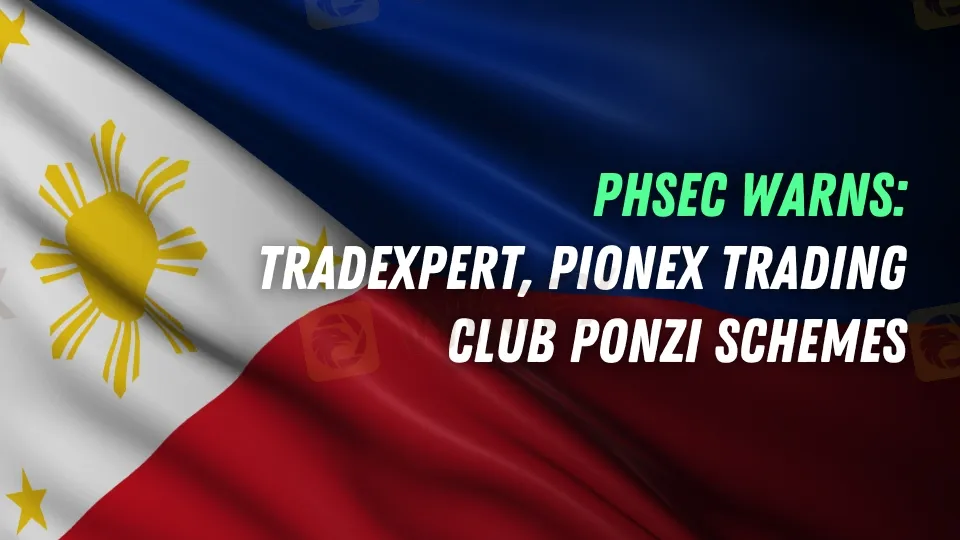简体中文
繁體中文
English
Pусский
日本語
ภาษาไทย
Tiếng Việt
Bahasa Indonesia
Español
हिन्दी
Filippiiniläinen
Français
Deutsch
Português
Türkçe
한국어
العربية
PHSEC Warns: TRADEXPERT, PIONEX Trading Club Ponzi Schemes
Abstract:The Philippines Security Exchange Commission warns against investing in TRADEXPERT and PIONEX Trading Club due to alleged Ponzi schemes.

Beware of two investing firms, TRADEXPERT and PIONEX Trading Club, the Philippines Security Exchange Commission (PHSEC) has sternly warned the public. Both organizations are thought to be running Ponzi schemes, which seriously endanger investors' financial situation.
Alleged Ponzi Scheme of TRADEXPERT
Led by Angelito Harina, TRADEXPERT promises to provide a hands-free trading experience by means of a creative trading bot meant to optimize profits while reducing risks. With daily income ranging from 1% to 1.5% and maturities between 10 and 30 days, the firm provides three investment options. TRADEXPERT also advocates a 12-month compounding interest plan with an apparently amazing rate of 8,538.06%.

The PHSEC has marked these products, in the meantime, as possibly fake. The Commission claims TRADEXPERT has not obtained the required permits to attract investments and is not incorporated as a company or a partnership. TRADEXPERT's approach is reminiscent of a Ponzi scheme, in which cash from new investors is paid expected earnings to past investors. Although top recruiters and early investors gain from this system, if fresh money runs out, it is unsustainable and negative for later investors.
The PHSEC underlines that each investment contract needs to be registered and that the organization has to have the right authorization to offer securities. The PHSEC recommends the public not to participate in this program as TRADEXPERTdisregarded these criteria. Those engaged in encouraging or supporting TRADEXPERT's investments might be subject to criminal responsibility with fines ranging from five million pesos (Php5,000,000.00), up to twenty-one year imprisonment.
Dubious Investment Made by PIONEX Trading Club Provides
Likewise, the PHSEC has expressed worries about the PIONEX Trading Club under CEO Reme Corpuz. With a minimum investment of Php1,000.00, the business attracts investors with promises of great monetary benefits and offers programs claiming to make 3% every day for 30 days or 30% to 75% in 7 to 15 days.


Investigators find that PIONEX Trading Club lacks the required authorization to trade securities and is not registered with the Commission. PIONEX's payback policies resemble those of a Ponzi scheme, in which fresh investor money is sent to past investors in order to pay fictitious gains. Although this unsustainable approach is meant to help top recruiters and early risk-takers, if fresh investments drop, it will seriously jeopardize later members.
Under the Securities Regulation Code (SRC) and the Financial Products and Services Consumer Protection Act (FCPA), the PHSEC underlines that these kinds of scams are dishonest and unlawful. Strong counsel is given to the public to stay away from PIONEX Trading Club investments. Promoters and supporters of these investments might also be subject to harsh fines of up to Five Million Pesos (Php5,000,000.00) and twenty-one-year jail terms.
Public Consultancy
Based on these results, the PHSEC advises people to be careful and diligent in evaluating investment possibilities. Often too good to be true, schemes offering very high returns with no risk might cause major financial losses.
To safeguard investors, the PHSEC will keep them under observation and act against unregistered companies and false investment plans. People are advised to confirm the validity of any investment possibility and notify the Commission of any dubious behavior.
Visit the PHSEC website or phone their hotline for further details. Keep educated and guard your money against bogus enterprises.
Visit WikiFX News for the latest updates and detailed reports on this critical issue. Stay vigilant and ensure your investments are safe.

Disclaimer:
The views in this article only represent the author's personal views, and do not constitute investment advice on this platform. This platform does not guarantee the accuracy, completeness and timeliness of the information in the article, and will not be liable for any loss caused by the use of or reliance on the information in the article.
Read more

The Hidden Checklist: Five Unconventional Steps to Vet Your Broker
Forex broker scams continue to evolve, employing new tactics to appear credible and mislead unsuspecting traders. Identifying these fraudulent schemes requires vigilance and strategies beyond the usual advice. Here are five effective methods to help traders assess the legitimacy of a forex broker and avoid potential pitfalls.

Doo Financial Obtains Licenses in BVI and Cayman Islands
Doo Financial, a subsidiary of Singapore-based Doo Group, has expanded its regulatory footprint by securing new offshore licenses from the British Virgin Islands Financial Services Commission (BVI FSC) and the Cayman Islands Monetary Authority (CIMA).

CFI’s New Initiative Aims to Promote Transparency in Trading
A new programme has been launched by CFI to address the growing need for transparency and awareness in online trading. Named “Trading Transparency+: Empowering Awareness and Clarity in Trading,” the initiative seeks to combat misinformation and equip individuals with resources to evaluate whether trading aligns with their financial goals and circumstances.

Malaysian-Thai Fraud Syndicate Dismantled, Millions in Losses Reported
The Royal Malaysia Police (PDRM) has received 26 reports concerning the Nicshare and CommonApps investment schemes, both linked to a major fraudulent syndicate led by a Malaysian citizen. The syndicate’s activities came to light following the arrest of its leader by Thai authorities on 16 December.
WikiFX Broker
Latest News
ASIC Sues Binance Australia Derivatives for Misclassifying Retail Clients
WikiFX Review: Is FxPro Reliable?
Malaysian-Thai Fraud Syndicate Dismantled, Millions in Losses Reported
Trading frauds topped the list of scams in India- Report Reveals
YAMARKETS' Jingle Bells Christmas Offer!
AIMS Broker Review
The Hidden Checklist: Five Unconventional Steps to Vet Your Broker
WikiFX Review: Something You Need to Know About Markets4you
Revolut Leads UK Neobanks in the Digital Banking Revolution
Fusion Markets: Safe Choice or Scam to Avoid?
Currency Calculator


